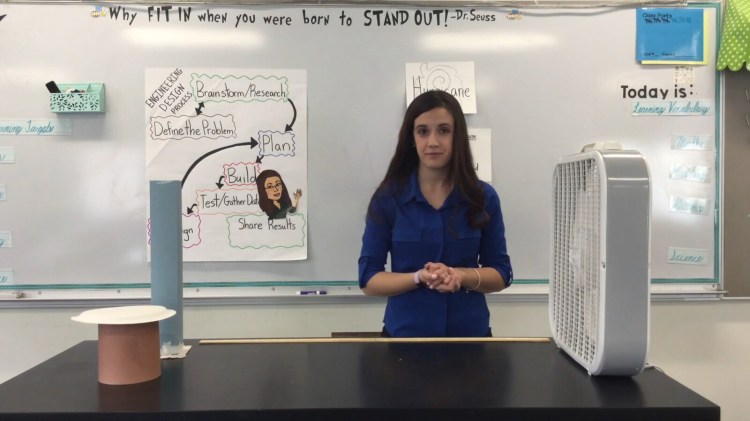A new show on Maine’s public TV network is aiming to help remote learners, especially those who don’t have access to the internet, while schools around the state remain closed.
“The Learning Space,” which premiered Monday on Maine Public, will feature teachers from around the state giving lessons for third-, fourth- and fifth-graders in a variety of subjects. It’s a partnership between the network, the Maine Department of Education and the advocacy and outreach group Educate Maine.
One of the show’s goals is to provide learning opportunities for some of the 30,000 or more Maine students who do not have access to their schools’ remote learning programs because of problems accessing broadband internet, said Mark Vogelzang, Maine Public’s president and chief executive officer.

Paula Bourque, literacy coach for Augusta schools, on an episode of “The Learning Space” on Maine Public. Photo courtesy of Maine Public
The show is a way for all kids stuck at home, but especially those with no internet access, to remain connected to school and learning while in isolation, said Heather Whitaker, a teacher at Gorham Middle School who is working on the show.
“If kids are stressing about being home, if they disengage, it’ll be that much harder to get them to engage again once schools are open,” said Whitaker, the 2020 Maine Teacher of the Year. “So as a parent of a fourth-grader myself, I’m thrilled to know I can turn on this show and get engaging, motivating lessons.”
The half-hour show is airing weekdays at 12:30 p.m., though it will eventually expand to an hour, Vogelzang said. The show can be seen on the stations of Maine Public, the state’s public TV and radio network, and is scheduled to air through the end of the school year, in June.
The show is geared to students in the third through fifth grades, partly because the partner organizations wanted it to have a limited scope and partly because educators feel those years are crucially important in a student’s long-term education, Vogelzang said.
The first episode featured a lesson on documentary writing by Paula Bourque, a literacy coach in the Augusta school system. Bourque explained different ways of documenting one’s own time and experiences though writing, including in a diary, zine, graphic novel and other forms. She held up examples and talked about how students could go about doing each type of writing. The lesson was especially timely, she told the students.
“One day your kids or your grandkids might ask you what it was like to live during the 2020 pandemic,” said Bourque. “You might think your life is kind of boring, but if you can write about it, it becomes a part of historical record-keeping.”

Cherrie MacInnes, a fourth-grade teacher at Greely Middle School in Cumberland, on an episode of “The Learning Space” on Maine Public. Photo courtesy of Maine Public
Other lessons planned for some of the first few episodes include one on weather and natural disasters, from Hillary Hoyt, a third-grade teacher at Leroy H. Smith School in Winterport, and another on how a bill becomes a law, from Cherrie MacInnes, a fourth-grade teacher at Greely Middle School in Cumberland. About 20 teachers have participated in the show so far, filming their segments in their homes or other locations by themselves or with help from their families. The content is reviewed by the Maine Department of Education, and the footage is then edited by Maine Public.
“The Learning Space” is taking the place of PBS children’s programming usually airing at midday. Those programs air at the same time on the PBS Kids network, which Maine Public also broadcasts on other channels, so people who want to see the regular children’s programming can tune to PBS Kids.
Maine Public broadcasts all its TV channels over the air, so students don’t need a cable or satellite service to watch “The Learning Space,” only an antenna, though the show and all Maine Public stations are carried on cable, satellite and streaming services as well.
Vogelzang said he was aware of public networks in other states doing things to meet the needs of isolated students, including creating new programs. Soon after schools shut down in the state, he began talking to people at Educate Maine and the Maine Department of Education, and found all parties shared concerns about remote learners who might not have internet access.
“We got together and tried to figure out what we could do for those kids,” said Vogelzang. “We heard from the educators that continuity of education is so important, and hopefully this will help with that.”
Send questions/comments to the editors.




Comments are no longer available on this story